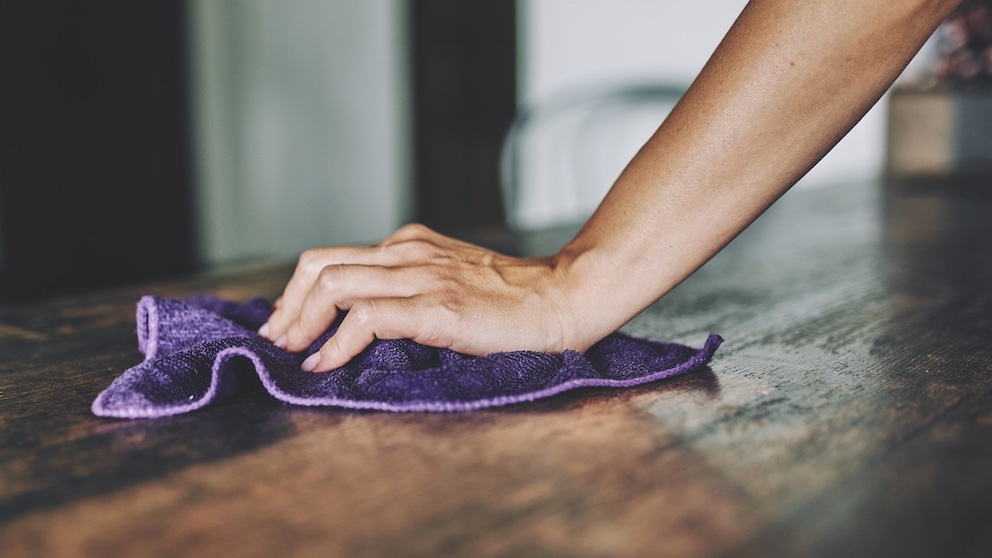March 30, 2025, 3:14 pm | Read time: 5 minutes
There is nowhere else where you can relax as well as you can within your own four walls. How comfortable and healthy you feel in your home depends not only on its aesthetics but also, to a large extent, on how hygienic and clean it is. Neglecting the regular cleaning routine can have serious consequences.
Skipping cleaning for a few days has never harmed anyone. However, if you go without dusting, vacuuming, disinfecting, or cleaning surfaces for a longer period of time, your health, well-being, and even your home itself will slowly suffer. What exactly happens when you stop cleaning?
Effects …
… on Health
Everyone knows the phenomenon: if the vacuum cleaner has not been touched for a long time, dust bunnies slowly collect in corners and on surfaces and begin to hop in a light breeze. As fascinating as the spectacle is, it is better to avoid it. As reported by the Federal Environment Agency, hazardous substances can accumulate in dust, including heavy metals and carcinogenic substances.
Excessive dust can also lead to respiratory issues if cleaning is neglected, potentially resulting in symptoms such as colds, sneezing fits, lung problems, or eye irritation. If there is a lot of dust in the air, it becomes increasingly difficult to breathe, and dry particles can settle in the airways. The air quality also suffers from unpleasant smells from leftover food or garbage, which, in the worst case, can promote mold growth and release toxic gases.
Speaking of mold, in damp areas, such as bathrooms or kitchens, fungi have an easy time of it if cleaning is not carried out. Mold not only leaves unsightly stains but, in the worst-case scenario, can also trigger allergies and serious health conditions like asthma or pneumonia.
Similar to mold, bacteria and germs also find the ideal breeding ground in warm homes. They settle particularly well on smooth surfaces and multiply unhindered. If you are constantly surrounded by germs, your immune system is challenged, you constantly feel ill, and you are more susceptible to infections.
… on Well-Being
Those who are not deterred by the above-mentioned effects will sooner or later notice a reduction in their well-being. Dirt and grime can cause stress and overload the brain, according to the Federal Environment Agency. According to this, problems of the nervous system are possible, which, in the worst case, could promote diseases such as dementia or Alzheimer’s.
Various studies have also shown that high levels of dust pollution weaken the blood-brain barrier, allowing harmful substances to enter the brain unfiltered. If the body is under constant stress due to a dirty environment, sleep disorders, restlessness, and listlessness can result.
… on the Furnishings
If you don’t clean your home for a long time, the interior can also wear out. Dirt and dust can get stuck in furniture or carpets and penetrate deep into the fibers. In the long term, you can hardly get them clean.
Dirt in the sink, washbasin, shower, or toilet can block the drains and corrode the material of the pipes. Constant flooding is just as possible as an infestation of pests that are attracted by dirt and permanent moisture. According to the tenants’ association, these include cockroaches, silverfish, ants, and flies. Leftover food and waste can also attract animals.

Cleaning routine How often you should clean in a single household

Causes and Solutions Prevent and Effectively Remove Mold in the Bathroom

Cleaning tips We Clean These 4 Household Items Too Often
Recommendations for the cleaning routine
How often a home should be cleaned depends on the individual’s perception of cleanliness. While some people reach for a vacuum cleaner and cloth every day, for others cleaning is a weekly or monthly routine at most.
Wet Areas
Bearing in mind that mold spores begin to sprout in damp environments after around 72 hours, wet areas such as bathrooms and kitchens should be thoroughly cleaned and disinfected around once a week. Because these rooms also come into contact with food and bodily fluids, the risk of bacterial and germ infestation is higher here. Antibacterial vinegar or lemon-based cleaners should, therefore, be used for cleaning. These also prevent limescale caused by water that is too hard. To prevent pest infestation, damp areas should be dried regularly.
Garbage
Since garbage cans can attract pests, it’s recommended that they be emptied on a regular basis. It is advisable to dispose of organic waste, in particular, every three days and to clean the bin thoroughly afterward.
Dust
Because skin flakes, textile fibers, pollen, soot, and fine dust are permanently in the air, depending on the life form, they can become noticeable on dark surfaces after just a few hours. A visible layer of dust can be reached within a week. This can only be prevented by regular damp dusting and vacuuming.
Ventilation can also ensure an exchange of air and transport the dust outside. Allergy sufferers can use special air purifiers. It is generally advisable to clean as soon as dust becomes visible — i.e., approximately every three to four days. If you schedule a deep clean once a week, you are on the safe side to prevent more serious damage.

